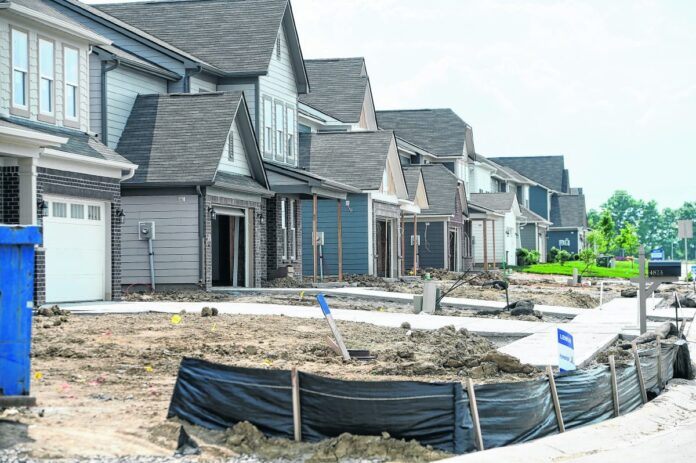
NEW PALESTINE — The southern half part of Hancock County is growing rapidly, and officials with the Town of New Palestine want to make sure they have the funds to deal with issues that can arise from major growth. The town’s leaders are considering adding impact fees to all new residential and commercial developers in the area and expect to make the idea official sometime this summer.
New development normally brings new residents, which can put a strain on an area’s infrastructure and services, including schools; libraries; water and sewer; and police and fire protection services. Impact fees, a one-time fee for new development, are designed to offset the additional cost of maintaining services. Impact fees are often an alternative to raising property taxes to pay for new infrastructure.
They aren’t taken lightly. Mike Dale, director of Hancock County Area Plan Commission, said the county has talked about impact fees for almost 20 years. Leaders have stopped short of adding them for fear of scaring away potential development. However, with so much growth in the area, creating impact fees probably should be revisited, Dale said
Fortville, McCordsville and Greenfield have impact fees.
New Palestine town manager Jim Robinson said two of the biggest reasons they want to implement impact fees is to help maintain roads and parks in the area.
“While we don’t have a lot of parks right now, you always want the amenities the community can use to be nice, and even the little pocket park we have, it requires maintenance,” Robinson said.
Town officials know they’ve missed out on thousands of dollars from potential impact fees with all the new housing development in New Palestine, but determined it’s better late than never to get on board with the revenue-generating opportunity.
“On the residential side, you’re probably talking about charging a certain amount per lot through the builder,” Robinson said. “For whatever reason we failed to do this years ago.”
Once the town gets a fund, they can then designate what the want the money would go for. The town council has asked town attorney, Ted Nolting, to double check with state officials and see how other municipalities have set their impact fees up and administered funds.
Nolting noted there are five categories of infrastructure impact fee revenues can be designated for including sewer/wastewater; parks and recreation; road and bridges; drainage and flood control along with water treatment storage and distribution.
“If we want to do some of the things for this town we’ve all talked about doing, I really think we’re missing the boat if we don’t jump on this right now,” council member Chris Lytle said at a recent council meeting.
Lytle wants to see the town implement the impact fees immediately and would like to see the money go toward parks and recreation and/or roads and bridges.
Council president Bill Niemier, who is a real estate lawyer, is in favor of implementing impact fees for new developers. He wondered why council leadership hadn’t used them in the past, noting the town has missed out on untold revenue with all the new development in the area affecting roads and services.
Years ago, one of his investors worked with the town and paid a large wastewater service hook-up fee for a new line, Niemier said. That, he said, showed the developer wanted to be a part of the community and was willing to pay their part for town services, which is what impact fees are all about.
“We’re not going to charge what places like Fishers and Carmel might charge for an impact fee,” Niemier said. “But, not charging anything no longer makes sense.”
Council member Brandee Bastin is adamant the council come up with a plan before implementing any fees on new developers and wanted residents to understand the fees will not be imposed on current residents or business owners.
“I know it’s the chicken and the egg; we can’t do anything before we have it, but we can’t go forward without a plan,” Bastin said.
Robinson is hoping any type of impact fees implemented on new developments could go toward the wastewater plant and offset any kind of future rate hike for current customers that could come due to expansion because of town growth.
“The last thing we want to do is raise rates at the sewer plant,” Robinson said. “Eventually we are going to upgrade the sewer plant, and impact fees could offset higher rates.”
[sc:pullout-title pullout-title=”What is an impact fee?” ][sc:pullout-text-begin]
An impact fee is a fee that is imposed by a local government on development projects to pay for all or a portion of the costs of providing public services to the new development.
These fees are usually implemented to help reduce the economic burden on local jurisdictions that are trying to deal with population growth within the area.
[sc:pullout-text-end]




